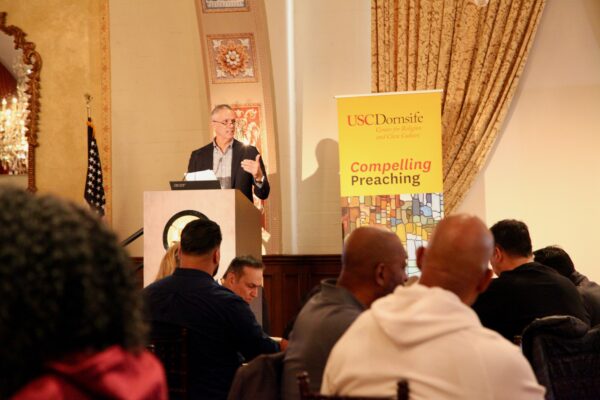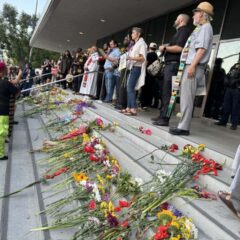The following were Richard Flory’s opening remarks at the USC Center for Religion and Civic Culture’s Compelling Preaching Across Divides conference, held on November 20, 2024.
Just two weeks ago, we had an election—you may have heard about it. This, and the past several elections, have shown that American society is closely divided in how it wants to be governed and what it thinks are essential for country.
The divides run not only on national issues, but through states, counties, and cities, large and small. The issues range from economic — taxes, inflation, inequality — to reproductive rights, individual identity and autonomy, immigration, the claim that religious people have a right to discriminate in public affairs against those whose lives they oppose, to what books children can access in their local libraries.
We can also see, and experience, these divides in our neighborhoods, families, churches and other faith institutions. No place it seems is immune to these deep divides, and how they affect our daily lives and interactions with others.
On the one hand, these divisions have always been with us — you know the old saying, “Don’t talk about religion and politics.”
On the other hand, almost five years ago, on January 6, 2020, we witnessed the lengths to which different groups will go to gain political power and try to establish the society they want, rather than what the voters have decided.
In 2017, my friend and colleague Brad Christerson and I published a book titled The Rise of Network Christianity, which focused on fast growing networks of what we called Independent Network Charismatic Christianity (INC). The book was one result from a larger project at CRCC on global Pentecostalism that investigated the growth and spread of Pentecostalism around the world. The question that oriented the research that Brad and I conducted was, given the role of Los Angeles in the emergence of Pentecostalism as a global religious movement through the 1906 Azusa Street Revival, what role could we identify for Los Angeles 100 years later?
What we found was something I don’t think either one of us expected — the fastest growing segment within Christianity that was made up of networks of independent congregations and their leaders, rather than large, cumbersome denominations or other associations. These were all led by charismatic preachers — calling themselves prophets — whose networks were all networked with each other. I would say though that not all of them were particularly compelling in their preaching style so much as the message they were promoting, which includes attaining access to supernatural power and taking over the seven “mountains” — core areas of influence — in society.
We argued that the advantage of networks was that they were more nimble and free of pesky things like organizational oversight, thus freeing them up from mundane issues such as dealing with denominational bureaucracies making them able to respond more quickly to both the challenges and the opportunities they faced.
Yet this freedom also results in leaders — apostles — having no real oversight by any governing body. This allows not only for organizational innovation, but for theological innovation, creativity, and experimentation, resulting in some entirely new teachings.
We are currently seeing such teachings not only in these networks, but in how many of the teachings that originated among INC prophets are finding their way into a wide range of Christian churches, not only within charismatic or Pentecostal churches, and even in otherwise secular circles.
These new teachings and the movement behind them also introduce tension and difference within churches, denominations, schools, and even in interpersonal relationships.
And, unless you are a latter-day Rip van Winkle who just awoke from a very long nap, you have undoubtedly experienced these differences and tensions in your own relationships, in your churches and even in yourself, as you work to figure out how to continue in your calling as a Christian pastor and preacher who is committed to introducing people to Jesus and to following his teachings, in the face of competing teachings from within Christianity that are at odds with the example and message of Jesus.
Which brings us to why we’re all here today, which I’ll frame as a question:
How can you, as preachers, remain true to your calling to preach the gospel, pointing people to live their lives according to the counter-intuitive and counter-cultural teachings of Jesus, when you are faced with what is essentially an alternative gospel that is oriented almost solely to gaining political and cultural power in the here and now?
Jesus asked: What shall it profit a person if they gain the whole world but lose their own soul?
The purpose of the Compelling Preaching initiative at CRCC is to create space for faith leaders to think about how to develop their preaching in an ever-changing social and cultural landscape. Our goal is to support preachers as they work to bring their message on important social issues both within and beyond the walls of their congregations.
We believe that preaching across differences and preaching truth to power, is an important endeavor and one that we seek to help the preachers involved in this initiative bring to life.
A first step in that process is to understand the social and political landscape that is currently before us. Who are the actors, and what are their goals? What do they really desire, and how will these new developments impact democracy and Christianity in the US going forward?
We are privileged today to have with us Dr. Matthew Taylor, who is a Senior Scholar at the Institute for Islamic, Christian, and Jewish Studies in Baltimore, where he specializes in American Christianity, American Islam, Christian extremism, and religious politics. His new book, The Violent Take It by Force: The Christian Movement that is Threatening Our Democracy (Broadleaf, 2024), tracks how a loose network of charismatic Christian leaders called the New Apostolic Reformation was a major instigating force for the January 6th Insurrection and is currently reshaping the culture of the religious right in the U.S.
Dr Taylor represents the kind of work that CRCC does: he is a scholar who is deeply committed to understanding religion but is also committed to making the knowledge he produces available to practitioners so that they can be better faith leaders and better participants in our democratic American experiment.




